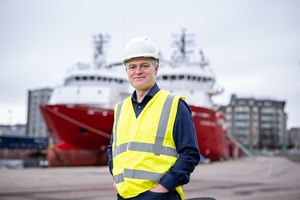OEUK: New North Sea oil and gas licenses to strengthen domestic energy security
(WO) – Offshore Energies UK says the award of new oil and gas licenses by the North Sea Transition Authority (NSTA) on Jan. 31 has the potential to strengthen homegrown energy security as the sector continues its expansion in wind, hydrogen and carbon capture and storage.
A total of 24 licenses have been offered in the second tranche of the NSTA’s 33rd licensing round with a third tranche to follow. This is important news for people across the industry and its supply chains, which support over 200,000 jobs across the UK.
Offshore Energies UK’s CEO David Whitehouse commented, “In this general election year, we face a choice: We can build a homegrown energy transition by backing our people, our offshore firms and our world class supply chain, or we can import even more energy and fail to grow our new wind, hydrogen and carbon capture industries. Policy decisions made today will be felt for generations to come. Our energy security, economic growth, and hundreds of thousands of jobs in almost every parliamentary constituency up and down the UK are at stake. “
“We all recognize that our energy mix must change and our sector is ramping up renewables and accelerating the drive to net zero. But this journey will take time. Meanwhile our North Sea basin is naturally declining. We have over 280 oil and gas fields but by the end of the decade 180 of them will have stopped producing. We need the churn of licenses for an orderly transition that supports jobs and communities across the country and meets our energy needs.”
“OEUK is working with all political parties to build an understanding of the sector’s strategic importance to the UK and help build realistic, practical plans for a homegrown energy transition with people at its heart. OEUK’s industry manifesto, which details how this transformation can be achieved, will be published later this month.”
How many active oil and gas fields are there in the North Sea? There are currently over 280 active oil and gas fields in the North Sea and by 2030 around 180 of those will have ceased production due to natural decline. The industry needs new licenses to ensure no cliff edge in domestic production. OEUK has warned that without fresh investment the UK will be reliant on oil and gas imports for 80% of its needs by 2030.
Why does the UK need more oil and gas licenses? Data from NSTA shows the UK only replaced 3% of production with new reserves in 2022, meaning that only 1 new barrel was invested in for every 33 existing barrels produced today (source: NSTA Oil and Gas resources report)
OEUK expects that 20 fields will have stopped producing last year, whilst only two will have started producing. For every one oil and gas well drilled, around three are closed.
Will the oil and gas produced in the UK be used in the UK? Around 75% of the UK’s total energy comes from oil and gas.
Around half of UK gas comes from the North Sea, while produced oil plays an important role in meeting UK, as well as European energy security, where over 70 per cent of the UK’s oil is used (source: OEUK Economic Report 2023).
Will new oil and gas production in UK waters prevent the UK from reaching net zero by 2050? Analysis from the NSTA in July showed that the carbon footprint of domestic gas production is around one-quarter of the carbon footprint of imported liquified natural gas.
As the UK is a rapidly declining producer of oil and gas, new oil and gas licenses reduce the rate of declining UK supplies, rather than increase it above current levels – so that the UK remains on track to meet net zero by 2050.
Does each license represent a new oil field? No. Each license does not represent a new oil field. Companies require licenses for a range of activity in so-called “blocks” – carefully mapped sections of the seabed in UK waters – starting from seismic and initial exploratory work through to production, either near existing infrastructure in previously known fields or in new fields.
Licensing is a normal part of most energy production regimes and is used in the UK to manage the development of oil and gas, wind and most recently, carbon capture projects. It is part of a bigger process which companies must undertake to explore, analyze, produce and then eventually decommission energy production
There is a constant churn in domestic production, meaning as reserves are depleted, licensed production is decommissioned, and new licenses are required to simply maintain the rate of decline. The UK’s oil and gas regime is heavily regulated, with applicants for licenses subject to strict commercial, environmental and health and safety conditions.



